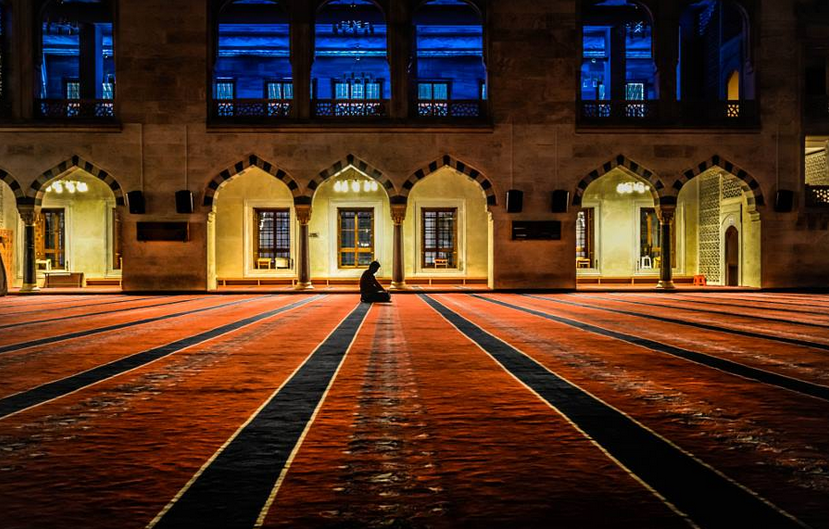By Editorial Staff
Prayer is a connection between a Muslim and His Lord, Allah. Prayer is the second pillar of Islam. Prayer was the last will of the Prophet (peace be upon him) and it is the first act that we will be judged by on the Day of Reckoning. Islam ordered us to offer prayers at their proper fixed times. Almighty Allah says:
Indeed, prayer has been decreed upon the believers a decree of specified times. (An-Nisaa’ 4:103)
One should think deeply over the tranquility and peace that he/she feels after offering prayer to the extent that one forgets pressure of business and social strains. The Prophet (peace be upon him) emphasized the importance of observing the five daily prayers in congregation, for thus the Muslim character is formed.
Supremacy of Fajr Prayer
Among the five daily prayers, Fajr, the early Morning Prayer is definitely the most valuable.
Establish prayer at the decline of the sun [from its meridian] until the darkness of the night and [also] the Qur’an of dawn. Indeed, the recitation of dawn is ever witnessed. (Al-Israa’ 17:78)
Imam As-Suyuti (may Allah have mercy upon him) said that the word “witnessed” in the above verse means that “both the angles of the previous night and the angles of the new morning intently listen to the Fajr Prayer being recited loudly because of its great status and virtues.” (Tafsir Al-Jalalayn)
Time of Fajr Prayer
The time for Fajr Prayer starts from the true dawn until sunrise, a period which lasts about one and a half hours. It was narrated that the Prophet (peace be upon him) said, “…and the time of the morning prayer is from the appearance of dawn, as long as the sun has not risen; but when the sun rises, refrain from prayer for it rises between the horns of the devil.” (Muslim)
The majority of scholars are of the view that it is recommended to offer the Fajr prayer at the beginning of its time, before the darkness of the night is dispelled.
Status and Rewards of Fajr Paryer
`Uthman ibn `Affan (may Allah be pleased with him) said, I heard the Messenger of Allah (peace be upon him) saying: “One who performs `Isha’ prayer in congregation, is as if he has performed Prayer for half of the night. And one who performs the Fajr prayer in congregation, is as if he has performed Prayer the whole night.” (Muslim)
Jundub ibn Sufyan (may Allah be pleased with him) narrated that the Prophet (peace be upon him) said, “He who offers the dawn (Fajr) prayer will come under the Protection of Allah. O son of Adam! Beware, lest Allah should call you to account in any respect from (for withdrawing) His Protection.” (Muslim)
Abu Musa (may Allah be pleased with him) narrated that the Prophet (peace be upon him) said, ‘Whoever prays the two cool prayers (`Asr and Fajr) will go to Paradise.” (Agreed Upon)
Buraidah ibn Al-Hasib (may Allah be pleased with him) narrated that the Prophet (peace be upon him) said: “Give good tidings to those who walk to the mosques in darkness for having a perfect light on the Day of Judgment.” (Abu Dawud)
Sakhr Al-Ghamidi narrated that the Prophet (peace be upon him) said: “O Allah, bless my people in their early mornings.” (Abu Dawud)
Abu Hurairah (may Allah be pleased with him)narrated that the Prophet (peace be upon him) said, “Angels keep on descending from and ascending to the Heaven in turn, some at night and some by daytime, and all of them assemble together at the time of the Fajr and `Asr prayers. Then those who have stayed with you over-night, ascent unto Allah Who asks them, and He knows the answer better than they, “How have you left My slaves?” They reply, “We have left them praying as we found them praying.” (Al-Bukhari)
`A’ishah (may Allah be pleased with her) narrated that the Prophet (peace be upon him) said, “The two Rak`ahs before the dawn (Fajr) prayer are better than this world and all it contains.” (Muslim)
Jarir (may Allah be pleased with him) narrated: “We were sitting with the Prophet (peace be upon him) and he looked at the moon on the night of the full-moon and said, “You people will see your Lord as you see this full moon, and you will have no trouble in seeing Him, so if you can avoid missing (through sleep or business, etc.) a prayer before sunrise (Fajr) and a prayer before sunset (`Asr) you must do so.” (Al-Bukhari)
Warning against Missing the Fajr Prayer
Abu Hurairah (may Allah be pleased with him) narrated that the Messenger of Allah (peace be upon him) said, “No Prayer is more burdensome to the hypocrites than the Fajr (dawn) prayer and the `Isha’ (night) prayer; and if they knew their merits, they would come to them even if they had to crawl to do so.” (Agreed Upon)
`Abdullah ibn Mas`ud (may Allah be pleased with him) narrated that: Mention was made before the Prophet (peace be upon him) of a man who slept throughout the night till morning. The Messenger of Allah (peace be upon him) remarked, “He is a man in whose ears Satan urinated.” (Agreed Upon)
How to Wake up for Fajr Prayer
1- Sleep early
2- Observe the etiquette of sleeping i.e. sleeping after performing ablution, saying the adhkar (remembrance) of sleep, and reciting the verse of Al-Kursi and the last two verses of Surat Al-Baqarah.
3- Eat less before going to sleep.
4- Take a nap during the day.
5- Intend sincerely to wake up for Fajr.
6- Get immediately out of bed when waking up.
7- Ask a family member or a friend to wake you up when they rise.
8- Ask for Allah’s help to wake you up the next morning.
May Almighty Allah make us all among those who rise and pray Fajr easily and consistently, out of submission and gratitude.
Learn how to offer the Fajr Prayer in the correct manner:
[opic_orginalurl]




